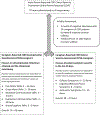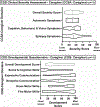The development, content and response process validation of a caregiver-reported severity measure for CDKL5 deficiency disorder
- PMID: 37751639
- PMCID: PMC10760432
- DOI: 10.1016/j.eplepsyres.2023.107231
The development, content and response process validation of a caregiver-reported severity measure for CDKL5 deficiency disorder
Abstract
Background: CDKL5 Deficiency Disorder (CDD) is a severe X-linked developmental and epileptic encephalopathy. Existing developmental outcome measures have floor effects and cannot capture incremental changes in symptoms. We modified the caregiver portion of a CDD clinical severity assessment (CCSA) and assessed content and response-process validity.
Methods: We conducted cognitive interviews with 15 parent caregivers of 1-39-year-old children with CDD. Caregivers discussed their understanding and concerns regarding appropriateness of both questions and answer options. Item wording and questionnaire structure were adjusted iteratively to ensure questions were understood as intended.
Results: The CCSA was refined during three rounds of cognitive interviews into two measures: (1) the CDD Developmental Questionnaire - Caregiver (CDQ-Caregiver) focused on developmental skills, and (2) the CDD Clinical Severity Assessment - Caregiver (CCSA-Caregiver) focused on symptom severity. Branching logic was used to ensure questions were age and skill appropriate. Initial pilot data (n = 11) suggested no floor effects.
Conclusions: This study modified the caregiver portion of the initial CCSA and provided evidence for its content and response process validity.
Keywords: CDKL5 deficiency disorder; Caregiver-report; Developmental attainment; Outcome measure; Severity; Validation.
Copyright © 2023. Published by Elsevier B.V.
Conflict of interest statement
Declaration of Competing Interest S. Ziniel has no COI. A. Mackie has no COI. J. Saldaris has no COI. H Leonard has consulted with Avexis, Anavex, GW Pharmaceuticals, Newron and Acadia Pharmaceuticals on unrelated subject matter. She has also consulted with Marinus Pharmaceuticals, Ovid Therapeutics and Orion Corporation regarding CDKL5 Deficiency Disorder. H Leonard has previously been funded by a NHMRC Senior Research Fellowship (#1117105). She has received funding from the NIH, International Foundation for CDKL5 Research, the Orphan Disease Centre University of Pennsylvania, Marinus Pharmaceuticals and Orion Corporation in relation to CDKL5 Deficiency Disorder. P. Jacoby has no COI. E. Marsh has consulted for Acadia Pharmaceuticals and Medscape. He is also the site PI for Acadia, Marinus, Takeda, Stoke, and Zogenix. He has received grants related to CDD from ICFR, RSRT, IRSF, NIH, and the State of Pennsylvania. B. Suter has received consulting fees for Ionis Pharmaceuticals, Neurogene and Taysha; all remuneration has been paid to his department. He also acted as investigator for clinical trials with Acadia, Marinus and Newron. E. Pestana-Knight has received consulting fees from Biomarin Pharmaceuticals, Zogenix, Marinus pharmaceuticals and Biocodex. She is a member of the scientific advisory board and speaker for Marinus Pharmaceuticals. H. Olson received consulting fees from Takeda Pharmaceuticals, Zogenix, and Ultragenyx regarding clinical trial design, Ovid Therapeutics regarding clinical trial results, Marinus Pharmaceuticals regarding CDKL5 Deficiency Disorder, and has done consulting for the FOXG1 Research Foundation. D. Price has no COI. J. Weisenberg has no COI. R. Rajaraman has consulted for Zogenix and Ultragenyx pharmacueticals. He is on the speaker’s bureau for Marinus Pharmacueticals. G. VanderVeen has no COI. T. Benke received research funding from GRIN2B Foundation, the International Foundation for CDKL5 Research, Loulou Foundation, the National Institutes of Health, and Simons Foundation; consultancy for Alcyone, GRIN Therapeutics, the International Rett Syndrome Foundation, Marinus Pharmaceuticals, Neurogene, Takeda Pharmaceutical Company Limited, Ultragenyx and Zogenix/UCB; clinical trials with Acadia Pharmaceuticals Inc., GW Pharmaceuticals, Marinus Pharmaceuticals, Ovid Therapeutics, and Rett Syndrome Research Trust; all remuneration has been made to his department. J. Downs has consulted for Marinus, Ultragenyx, Orion and Taysha; clinical trials with Anavex; all renumeration has been made to her department. She has received funding from the NIH and International Foundation for CDKL5 Research in relation to CDKL5 Deficiency Disorder. S. Demarest has consulted for Biomarin, Neurogene, Marinus, Tysha, Ultragenyx, Zogenix and Ovid Therapeutics. He has funding from project 8P and Mila's Miracle Foundation. He also serves on the advisory board for the non-profit foundations SLC6A1 Connect, Project 8P, Ring14 USA and FamilieSCN2A.
Figures


References
-
- Artino AR Jr., Durning SJ, Sklar DP, 2018. Guidelines for Reporting Survey-Based Research Submitted to Academic Medicine. Acad Med 93, 337–340. - PubMed
-
- Bayley N, Aylward GP, 2019. Bayley Scale of Infant and Toddler Development, Fourth Edition (Bayley™-4).
-
- Berg AT, Kaat AJ, Zelko F, Wilkening G, 2022. Rare diseases - rare outcomes: Assessing communication abilities for the developmental and epileptic encephalopathies. Epilepsy Behav 128, 108586. - PubMed
-
- Demarest S, Pestana-Knight EM, Olson HE, Downs J, Marsh ED, Kaufmann WE, Partridge CA, Leonard H, Gwadry-Sridhar F, Frame KE, Cross JH, Chin RFM, Parikh S, Panzer A, Weisenberg J, Utley K, Jaksha A, Amin S, Khwaja O, Devinsky O, Neul JL, Percy AK, Benke TA, 2019a. Severity Assessment in CDKL5 Deficiency Disorder. Pediatr Neurol 97, 38–42. - PMC - PubMed

